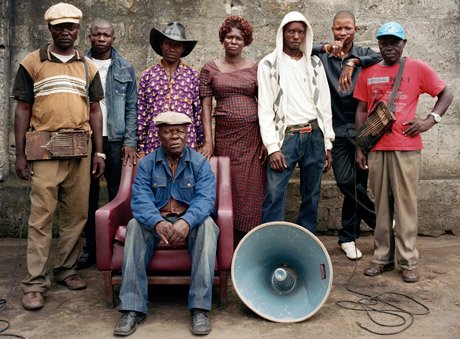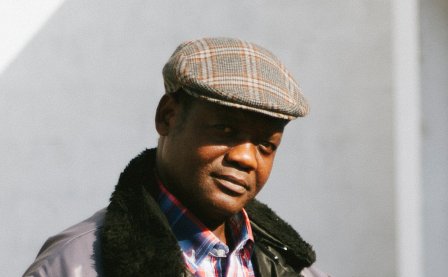I originally heard about Konono No. 1 through the local Philly radio station XPN. They’d mentioned the typical bio about the band being a “world music punk” group, and even though that doesn’t quite describe the music in the right way, I was still interested. When I heard that the likembe (thumb piano) was heavily featured, I was more intrigued. Then when I heard that their amplifiers were crafted together from car parts, I was enraptured enough to not only go see them but bring friends. Needless to say, their live show was unlike anything I’d ever witnessed.
The part I didn’t hear about Konono No. 1 in their bio was their long history. After recently reading a post on the Ngoma Sound blog about Congolese footwork and Mbira rap, I found my way to a Vincent Kenis interview (the producer of the Congotronics CDs and founder of Crammed Discs) in which he discussed the Mungua Muanga cassette and the origins of Konono No. 1.
First off, the cassette was released on the famed and now-defunct France Culture radio label Ocora. Founded by Pierre Schaeffer in 1954, the label started with an African focus based on a pretext that the rise of radio would jeopardize the musical traditions of African villages. Over the years, it spread to Eastern countries and eventually the rest of the world. From an ethnomusicology standpoint, it’s most likely the closest precursor to the modern Sublime Frequencies label, even if Ocora didn’t primarily focus on psych-rock/Western-influenced bands.
Vince Kenis heard the Konono musicians for the first time on this French radio broadcast in 1979, and was so fascinated by the band’s sound that he recorded the performance. Then by chance the broadcast was released officially by Ocora in 1987 as Musiques Urbaines a Kinshasa. By 1989, ten years after he’d first heard the band, Kenis went to Kinshasa to seek out Konono No. 1 and another band from the cassette — of course, he couldn’t find either band. When he went back another time in the mid-90’s, he heard that the Konono musicians had dispersed and stopped playing. It wasn’t until 2000 when the president of the group’s fan club alerted Kenis that they were expected to return. Kenis recalls:
In July Le Tout Puissant Likembe Konono No. 1 was ready for an audition, complete with 3 electric likembes, a drumkit made of hub caps, and a PA system made of two “lance-voix” (“voice-throwers,” i.e. megaphones used by the Belgian colonizers before independence to diffuse radio broadcasts in the streets) which were probably the same ones featured on the 1978 recordings.
Kenis recorded the band soon after and the album was eventually released to rave reviews in 2004, with European and Western audiences and critics especially hyping up the noisy/punk/electronic aspects of the record. Besides bringing the excellent live show around the world and showcasing other artists and the scene surrounding the Congotronics sound, the album has been name checked in the ongoing think-piece-friendly critical debate concerning world music, otherness, post-colonialism, etc. (see also: David Byrne, Paul Simon, Vampire Weekend).
Don’t get me wrong, there are plenty of interesting modes of thought in that discussion, but in the age of instant access to media through BitTorrent, Mediafire, YouTube, what have you, I think my favorite part of the Konono No. 1 story is how it’s also really the story of one man’s pursuit of a band in the hopes of spreading their music — to give others the same feeling he felt when he listened to this 1970’s broadcast and had to have a recording. Vince Kenis’ dedication seems just as relevant as talking about the band’s instruments or their role in some larger geopolitical ethnomusicological debate. His story is why we even have a section like this on the website.
More about: Konono N°1



